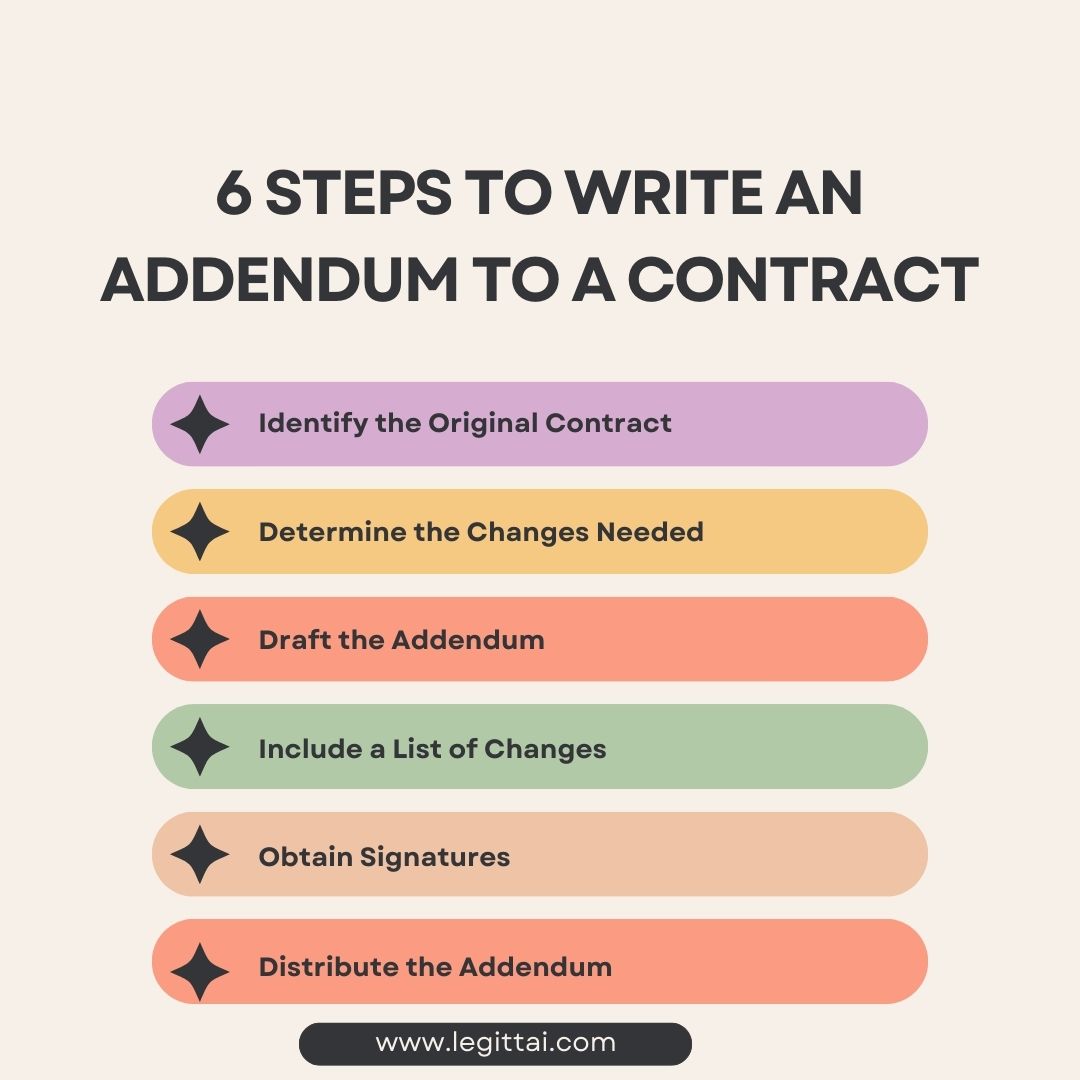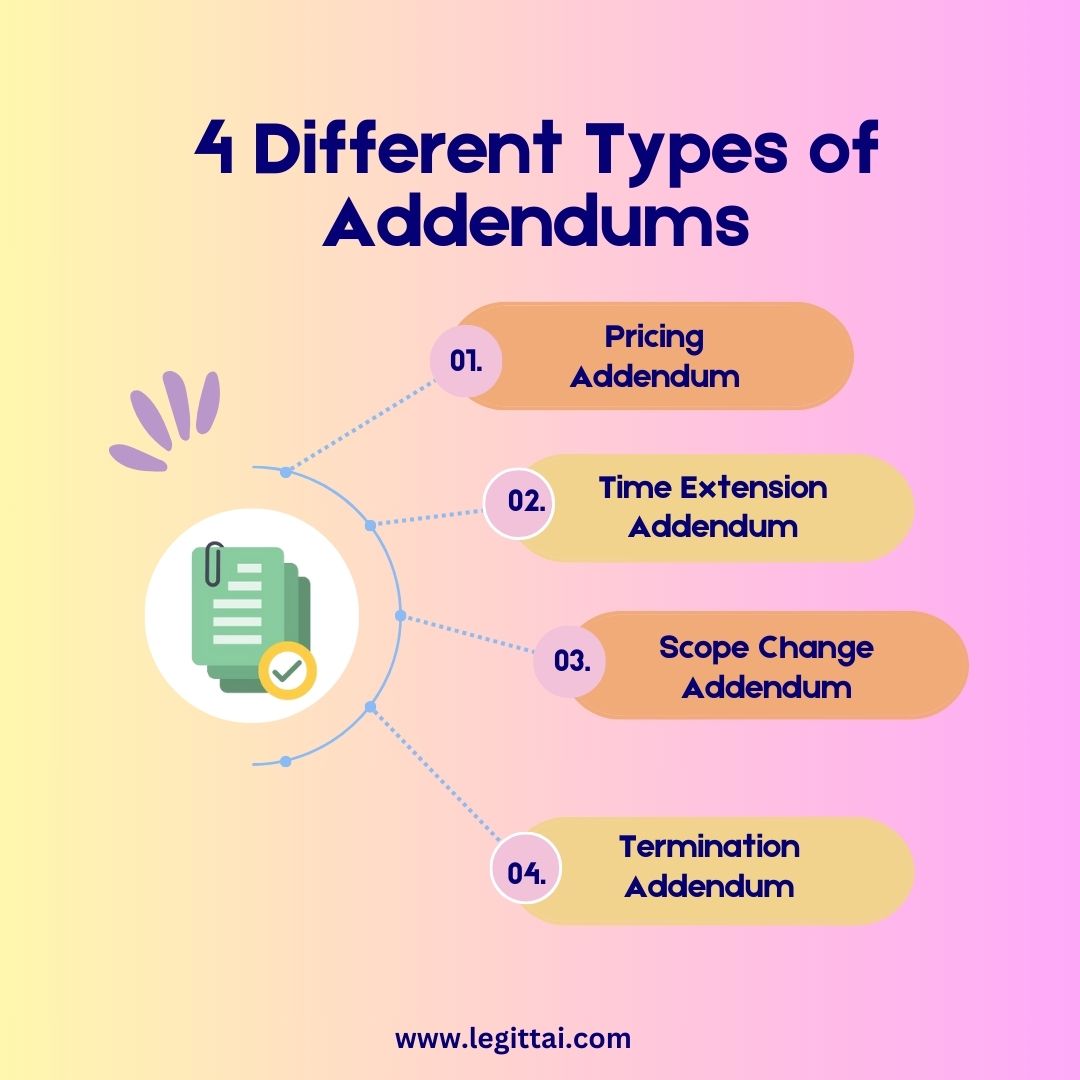
In the business world, contracts are an essential tool for formalizing agreements between two or more parties. However, as circumstances change, it may become necessary to modify the terms of the contract. This is where an addendum comes in. In this article, we will define what an addendum is and guide you on how to write an addendum.
Also Read: Contract administration vs contract management
What’s inside?
What is an Addendum to a Contract?
An addendum is a legal document that is added to an existing contract to modify, clarify, or supplement its terms. Adding an addendum to a contract is a separate document from the original contract and serves as a way to make changes to the contract without having to create an entirely new agreement. Addendums can be used to add or remove provisions, change the scope of work, update timelines, or alter payment terms, among other things.
Addendums can be particularly useful in the technology industry, where contracts can be complex and involve multiple parties. For example, if a software company wants to update the functionality of their product, they might need to add an addendum to their existing contract with a client to clarify the scope of work and the timeline for delivery.
Also Read: Signature guarantee vs notary
How to Write an Addendum to a Contract?
- Step 1: Identify the Original Contract
- Step 2: Determine the Changes Needed
- Step 3: Draft the Addendum
- Step 4: Include a List of Changes
- Step 5: Obtain Signatures
- Step 6: Distribute the Addendum
Writing and adding an addendum to a contract requires careful consideration of the original contract and the specific changes that need to be made. Also, there is a variety of free contract templates available on the internet where users may get contract addendum templates and customize them according to their needs and purpose. Here is a step-by-step guide on how to write an addendum to contract:

Identify the Original Contract
Before you can write an addendum to contract, you need to identify the original contract that you want to modify. Make sure you have a copy of the original contract and read it carefully to understand the terms that are currently in place.
Also Read: Can I notarize for a family member in NY
Determine the Changes Needed
Once you have identified the original contract, determine the changes that need to be made. You should be as specific as possible and clearly articulate what changes you want to make. For example, if you are adding a new section to the express or implied contract, clearly label it and provide a detailed explanation of what the new section covers.
Also Read: What is CLM
Draft the Addendum
Using the changes you have identified, draft the addendum. The addendum should be a separate document from the original contract and should clearly state that it is an addendum to the contract. It should include the date the addendum is being executed, the names of the parties involved, and a reference to the original contract.
Also Read: How to write a contract proposal
Include a List of Changes
In the addendums to contracts, include a list of the changes being made to the original contract. This list should be detailed and specific, so there is no confusion about what changes are being made. If possible, include the exact wording of the original contract that is being modified, followed by the new wording.
Also Read: What can contract management software ensure
Obtain Signatures
Once the addendum has been drafted, it is essential to obtain signatures from all parties involved. Each party should sign the addendum, and their signature should be witnessed by a third party.
Also Read: Contract lifecycle management blockchain
Distribute the Addendum
After all parties have signed the addendum, distribute copies to everyone involved. Keep a copy for your records, and make sure that everyone else has a copy as well. It is also a good idea to file the addendum with the original contract for safekeeping.
Also Read: How to get an affidavit notarized
Contract Addendums vs Contract Amendments
The easiest difference between the two terms to remember is that contract amendment modifies an existing contract whereas an addendum adds to the same.
Clarifications and additions that were not initially included in the original contract or agreement are made using an addendum. Consider addendum as modifications to the original contract, such as adding a deadline where none was present in the original. All contracts must be properly executed with intent, demonstrating that all parties are fully aware of the expanded scope and are actively agreeing to it, in order for a contract addendum to be legally valid.
An amendment is often used to alter a provision of the original contract. Think of amendments as changes made to the original agreement such as extending a deadline. In the service sector, contract amendments are frequently used when a client wants to modify or clarify the project’s scope.
Also Read: How to write a contract
Tips for Writing an Effective Addendum to a Contract
Writing an addendum requires careful consideration and attention to detail. Here are a few tips to keep in mind:
- Be specific: The more specific and detailed you are about the changes being made, the less chance there is for confusion or misunderstandings.
- Use clear language: Avoid using legal jargon or complex language that could be difficult for others to understand. Keep the language clear and concise.
- Include a reference to the original contract: Make sure to include a reference to the original contract in the addendum, so it is clear which contract is being modified.
- Obtain signatures from all parties: It is essential to obtain signatures from all parties
Also Read: Contract Redline
What are the Different Types of Addendums?
There are different types of addendums that can be used depending on the situation. Some common types include:

Pricing Addendum: This type of addendum is used to modify the pricing terms of a contract. It may be used to adjust the cost of goods or services, or to add fees or expenses that were not included in the original contract.
Time Extension Addendum: This type of addendum is used to extend the deadline or time period of a contract. It may be used to give parties more time to complete their obligations or to adjust the timing of payments.
Scope Change Addendum: This type of addendum is used when there are changes to the scope of work outlined in the original contract. It may be used to add or remove tasks or to clarify the work that needs to be done.
Termination Addendum: This type of addendum is used to terminate an existing contract before its expiration date. It may be used when parties agree that it is no longer feasible or desirable to continue with the original agreement.
Did you find this Legitt article worthwhile? More engaging blogs about smart contracts on the blockchain, contract management software and electronic signatures can be found in the Legitt Blogs section. You may also contact Legitt to hire the best contract lifecycle management services and solutions.
FAQs on How to write an addendum
How do you add an addendum to an online contract?
To add an addendum to an online contract, you would need to follow the same process as adding an addendum to a physical contract. Review the original contract, state the purpose of the addendum, outline the changes, and have all parties involved sign the addendum.
How is an addendum different from an amendment to a contract?
An addendum is a document that adds or modifies existing provisions of an existing contract, while an amendment changes existing provisions. An addendum is typically used for minor changes, while an amendment is used for more significant changes.
Does an addendum need to be signed by all parties involved in the contract?
Yes, an addendum needs to be signed by all parties involved in the original contract. This includes the individuals or companies that signed the original agreement, as well as any new parties that are being added to the contract through the addendum.
Can an addendum be added to any type of contract?
Yes, an addendum can be added to any type of contract as long as both parties agree to the modifications or additions. It is typically used when parties want to make minor changes to the original contract without renegotiating the entire agreement.
Can an addendum be used to modify or cancel an existing contract?
An addendum can be used to modify an existing contract, but it cannot be used to cancel an existing contract. A termination addendum would need to be created to cancel a contract before its expiration date.
Can an addendum be added to a contract after it has been signed?
Yes, an addendum can be added to a contract after it has been signed, as long as all parties involved agree to the modifications or additions. However, it is recommended to add an addendum before the contract's effective date to avoid any confusion or disputes.
How many addendums can be added to a single contract?
There is no limit to the number of addendums that can be added to a single contract, as long as both parties agree to the modifications or additions. However, adding too many addendums can make the contract more complex and harder to understand.
Are there any risks involved in using an addendum to modify a contract?
Yes, there are some risks involved in using an addendum to modify a contract. It's important to ensure that the modifications or additions are clear and unambiguous to avoid any disputes. Failing to properly draft or execute an addendum can result in legal issues or financial losses.
